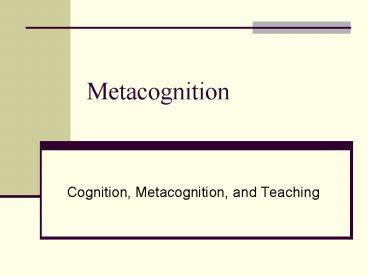Metacognition PowerPoint PPT Presentation
1 / 8
Title: Metacognition
1
Metacognition
- Cognition, Metacognition, and Teaching
2
Metacognitive Knowledge and Regulation
- The literal definition of metacognition would be
cognition about cognition or knowledge about
knowing and learning - We use metacognitive knowledge, then, to monitor
cognitive processes such as reasoning,
comprehension, and problem solving - According to Brown, Brnnsford, Ferrara,
Campione (1983), differences in metacognitive
knowledge and skills can affect how well and how
quickly people learn - Metacognition involves three things
- Declarative knowledge about yourself as a learner
and about strategies, skills, and resources
needed to perform a task - Procedural knowledge about how to use those
skills, resources, strategies, etc - Conditional knowledge about when and why to use
them
3
Metacognitive Knowledge and Regulation
- Metacognition is used to regulate thinking and
learning - Planning in the planning stage, the learner
determines how much time to apply to a task, what
strategies he/she will use, how to start the
task, what resources he/she will need, what to
read carefully vs. what to skim, etc. (Brown,
1987 Woolfolk, 2005) - Monitoring in the monitoring stage, the learner
constantly is aware of how he/she is doing in the
learning process. They ask questions and
determine whether what they are learning/doing
makes sense. - Evaluating in the evaluating stage, the learner
determines whether he should change strategies or
get help or give up, or be finished, etc. - When is metacognition most useful?
- Metacognition is not useful when tasks are
routine. It is most useful when tasks are
challenging, but not too difficult!
4
Individual differences in Metacognition
- Metacognitive abilities begin to develop around
age 5 or 7. - They continue to improve throughout school years.
- Stu
- Developmental
- Two questions that kids can ask themselves or
that teachers can ask students can help students
become more metacognitive (see Perry, et al.,
200) - What did you learn about yourself as a
reader/writer/learner today? - What did you learn that you can do again and
again and again? - Students, however, vary greatly in their
metacognitive abilities - some differences are
probably biological or variations in learning
experiences
5
Individual and Working Memory (Developmental
Differences)
- Young children have limited working memories this
improves with age either because there is a
change in memory capacity or in improvements of
strategy use - Young children have to learn to execute basic
operations in addition to other things, which may
take up some of the space in their memories - Once an operation is mastered, they can store the
process in long term memory and working memory is
not needed to complete that task - As children grow, they develop more effective
strategies for remembering information (Woolfolk,
2005) - Rehearsal strategies (such as repeating
information) seems to develop around age 5 or 6 - However, we can also teach students rehearsal
strategies but, unlike their older counterparts,
they may need to be reminded to use strategy and
then the often use the wrong strategies to solve
problems - Some developmental differences in strategy use
are that around age 6, students discover
organizational strategies but these strategies
are not used spontaneously until ages 9 or 10
6
Individual Differences
- Some people have more efficient working memories
than others - Differences in working memories may be associated
with giftedness in math or verbal areas - The major individual difference that affects long
term memory is knowledge - Think about the module on cognitivism to come up
for a reason why this might be the case
7
Development of Declarative Knoweldge
- In addition to probably the best strategy of
making the learning/lesson meaningful, there are
many systematic procedures for improving memory
(otherwise known as mnemonics). - Loci Method?
- Chunking Technique
- First Letter Association Technique
- Rhyme Technique
- Peg-type mnemonics or pegword mnemonics
- Acronym
- Chain mnemonics
- Keyword method
8
Rote Memorization
- Rote memorization very few things need to be
learned by rote rote memorization is remembering
information by repetition without necessarily
understanding the meaning of the information - However, on the occasion when things need to be
memorized, there are several strategies that
may/may not be effective. This is especially
important because where there are long lists,
there is a serial position effect or a tendency
for learners to remember the beginning and end
but not middle of a list - Part learning is when we break lists into shorter
lists in order to make the memorization easier - Distributed practice is practicing the
information in brief periods with rest in between - Massed practice (not very effective) is practice
of information for a single extended period (this
leads to fatigue) - Consider this question In educational
psychology, there are differing positions on rote
memorization. Some researchers are in favor of
it. Others are not. To which of these positions
do you most relate? - Rote memorization creates inert knowledge
- Rote memorization can be effective

